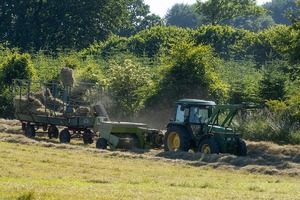Qatar Agribusiness Market Forecast 2024: Trends, Challenges, and Opportunities
Body
The Qatar agribusiness market has been evolving steadily over the past few years, driven by innovations, a growing population, and the government’s commitment to ensuring food security. As Qatar looks towards 2024, the agribusiness industry is expected to witness significant developments, supported by technological advancements, strategic investments, and the country’s vision for sustainable growth. This article explores the forecast for Qatar’s agribusiness market, highlighting key trends, challenges, and opportunities.
Qatar’s Agribusiness Market in 2024: An Overview
Qatar's agribusiness market is witnessing rapid changes as it adapts to modern technologies and innovative farming practices. With the country’s focus on reducing its dependency on imports and ensuring food security, the government has been actively promoting the development of domestic agricultural production. By 2024, the market is expected to expand significantly, driven by both local and international investments, government initiatives, and growing demand for fresh, locally grown produce.
Key Drivers of Growth in Qatar’s Agribusiness Market
Several factors are expected to contribute to the growth of Qatar's agribusiness market in 2024. These include:
- Government Support and Investments
The Qatari government has recognized the importance of food security and has implemented policies that encourage local farming and agricultural innovation. Investments in smart agriculture, vertical farming, and hydroponics are expected to grow, enhancing productivity and sustainability in the agricultural sector. Additionally, the Qatar National Food Security Strategy plays a pivotal role in strengthening the nation’s agricultural capabilities. - Technological Advancements in Farming
Qatar is investing heavily in modern farming techniques to overcome its limited arable land and water resources. The use of smart agriculture, drones, artificial intelligence, and climate-controlled greenhouses is expected to play a major role in improving the efficiency and scalability of local farming operations. These innovations will help boost production and ensure a consistent supply of fresh food year-round. - Sustainability Initiatives
Sustainability has become a key priority in Qatar's agribusiness sector. As part of its commitment to environmental protection and sustainability, the country is focusing on energy-efficient farming practices and water conservation. In 2024, we can expect to see a rise in organic farming, precision agriculture, and eco-friendly packaging, catering to the growing consumer demand for sustainable food options.
Challenges Facing Qatar’s Agribusiness Market
Despite the positive growth outlook, there are several challenges that the agribusiness market in Qatar must navigate:
- Climate and Resource Constraints
Qatar’s harsh climate and limited natural resources, such as water and arable land, remain significant obstacles for large-scale agricultural production. While advanced technologies like hydroponics and vertical farming can mitigate some of these issues, the reliance on these systems still presents challenges in terms of cost, scalability, and resource management. - High Operational Costs
The initial investment for adopting innovative farming techniques and technologies can be high. This poses a barrier for smaller players in the market, limiting their ability to compete with larger, more established companies. Additionally, transportation and distribution costs can increase due to the need for cold storage and rapid delivery to maintain product quality. - Labor Shortage
The agricultural sector in Qatar may face labor shortages, particularly in specialized fields such as farm management, horticulture, and agronomy. Recruiting skilled labor and retaining experienced workers in the face of competition from other industries will be an ongoing challenge for agribusiness operators.
Opportunities in Qatar’s Agribusiness Market
Despite the challenges, there are abundant opportunities for growth in Qatar's agribusiness sector:
- Expanding the Local Market
As Qatar strives for self-sufficiency, there will be increasing demand for locally grown food products. This presents a unique opportunity for agribusinesses to supply fresh produce, dairy, meat, and poultry to meet the needs of the growing population. Consumers are also becoming more health-conscious, creating a favorable market for organic and sustainable food products. - Investment in Research and Development
Qatar’s agribusiness sector offers opportunities for international collaborations in research and development. By investing in R&D and partnering with global agritech firms, local companies can adopt best practices and cutting-edge technologies to enhance production and efficiency. This will also facilitate the development of climate-resilient crops suited to Qatar’s environment. - Export Opportunities
With Qatar’s strategic location and access to global markets, there is potential to expand agribusiness exports. By increasing domestic production and establishing high-quality standards, Qatar can tap into regional markets in the GCC and beyond, exporting fresh produce, processed food, and other agricultural products.
For More Info https://gmiresearch.com/report/qatar-agriculture-market/
Conclusion: A Promising Future for Qatar’s Agribusiness Market
Qatar’s agribusiness market in 2024 is poised for significant growth, driven by government initiatives, technological advancements, and a commitment to sustainability. While challenges like climate constraints and operational costs remain, the opportunities for innovation, local market expansion, and exports present exciting prospects for the industry. As Qatar continues to invest in its agribusiness sector, the nation is on track to become a leader in food security and sustainable agriculture in the region.













Comments